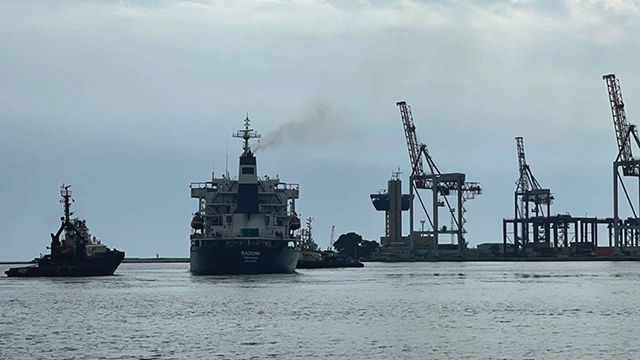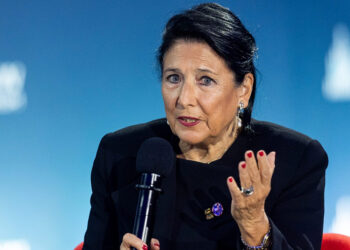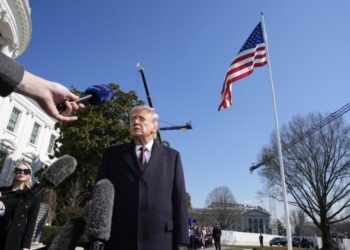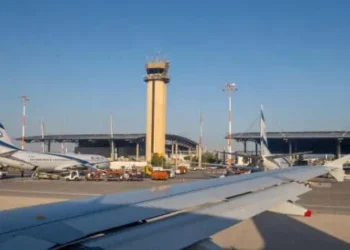Russia said Wednesday that it will resume its participation in the Black Sea grain initiative, a deal with Ukraine to enable vital agricultural exports from the country, saying it had received assurances from Ukraine that it would not use the humanitarian maritime corridor for military purposes.
Russia had withdrawn from the deal, which was brokered by the UN and Turkey in July to help ease global food shortages and price rises, after it accused Ukraine of attacking its Black Sea Fleet in Sevastopol in Crimea last Saturday.
Before last weekend’s drone attack, analysts noted that Russia already appeared to be laying rhetorical groundwork for withdrawing from the deal, before reversing course this week.
The grain is critical to feeding populations in some of the world’s poorest countries, and a return to a full blockade could have brought famine to millions in Asia and the Middle East.
UN Secretary-General Antonio Guterres welcomed the announcement from Russia on its resumed participation in the implementation of the Black Sea Grain Initiative.
Guterres “is grateful for the diplomatic efforts of Turkey, and thanks the UN Coordinator, Amir Abdulla, and his team for their work to keep this vital food supply line open,” wrote UN Secretary General spokesman Stephane Dujarric.
Dujarric added that the Secretary-General “continues his engagement with all actors towards the renewal and full implementation” of the deal.
Zelensky: 40% of Ukraine’s entire energy infrastructure seriously damaged by Russian strikes
Ukraine’s President Volodymyr Zelensky said that about 40% of his country’s entire energy infrastructure has been seriously damaged by Russian missile and drone strikes, and attacks with such weapons continue to challenge Ukraine’s armed forces.
Moscow has carried out several devastating missile and drone strikes against what Ukraine said were civilian targets and critical infrastructure, such as energy facilities.
Iran and Russia have sharply denied reports that Tehran supplied Moscow with a fleet of drones for the Kremlin’s war in Ukraine. The Kremlin has also repeatedly denied that it uses Iranian-made drones to target residential and other high civilian areas.
On Wednesday morning, Ukraine’s air force said it had shot down 12 out of 13 Iranian-made Shahed-136 drones in central and eastern regions of the country overnight. Donetsk, in eastern Ukraine, remains the epicenter of fierce fighting between Ukrainian and Russian forces.
Ukraine claims it hit significant Russian military systems in Kherson
Ukrainian officials say that the military struck an important target in the southern region Kherson, as the pro-Russian authorities continue to press civilians to leave.
Serhii Khlan, member of the Kherson Regional Council, said that Ukrainian forces hit Russian air defense systems close to the stadium in Kherson city. Those systems had been used to shell Mykolaiv, sometimes with devastating effect.
Khlan posted a photograph purportedly showing the “remains of the equipment.”
Khlan said there had also been further hits in the area of the Antonivskyi Bridge, where Russian forces and the pro-Russian administration have been operating ferries and pontoon bridges to resupply the west bank, where thousands of Russian troops remain.
He said that in the city of Kakhovka, on the east bank of the river Dnipro, the three streets closest to the river were being forcibly evacuated. He said the “Russians in the city are digging in, setting up concrete trenches.”
Khlan said the Russians “are digging in on the east bank, preparing for defense, thinking that this makes our offensive impossible. But the resistance movement and the Armed Forces of Ukraine continue to fight.”
Russia’s Economy Shrinks 5% year-on-year in September, Economy Ministry Reports
Russia’s economy shrank by 5% on an annualized basis in September, the economy ministry said, a sharper contraction than the 4% recorded a month earlier.
Western sanctions and the fallout from Russia sending tens of thousands of troops into Ukraine in February have pushed the country into recession, but Moscow says the West has failed to destroy the Russian economy.
Earlier this year, economists were predicting a double-digit recession for 2022. The economy ministry said in a statement on Wednesday that the country was on track to post a 2.9% contraction this year, and that September’s slump was due to a high base effect in comparison with the same month last year.
Russia suspends ‘partial mobilization’ of citizens for Ukraine war
Russia has announced that its “partial mobilization” of hundreds of thousands of citizens to fight in the country’s war on Ukraine has been completed, bringing to an end a controversial draft that sparked protests and an exodus of men from the country.
The Russian Ministry of Defense said Monday that all partial mobilization activities, including summons deliveries, had been suspended, along with “all activities related to conscription for military service.”
Military units will only be accepting volunteers and contractors from now on, a statement from the ministry added.
President Vladimir Putin announced the mobilization in late September after Russia suffered a series of major setbacks on the battlefields in Ukraine. Officials said the draft’s target of recruiting 300,000 personnel had been met as of last week.
While Putin has defended the draft, its chaotic execution led to angry demonstrations and prompted hundreds of thousands to flee Russia.
Putin said Tuesday that the mobilization had been “completed” and that “the line has been drawn,” a suggestion that there would be no further drafts. He added that 41,000 of those recruited were currently in combat formations of the Russian military, meaning that “almost 260,000 people are not participating in any hostilities, but are being trained.”
The rollout of the mobilization was beset by errors. Early on in the process, some residents in areas including Russia’s Far East Sakha Republic were conscripted “by mistake,” despite not being eligible for mobilization, such as fathers of underage children, according to a local leader there.
After it was announced, protests erupted in ethnic minority regions, and some military enlistment offices were set on fire. The original announcement also sparked rare anti-war demonstrations across Russia.
By Ana Dumbadze














